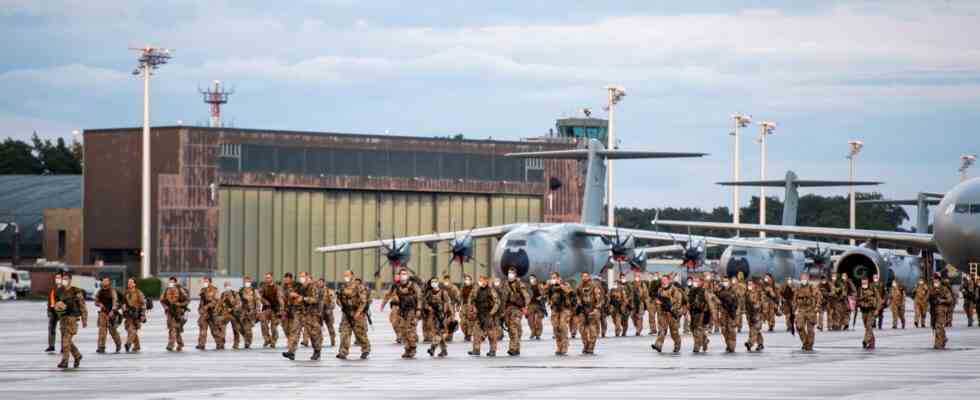Status: 08/08/2022 02:52 a.m
A year ago, the radical Islamic Taliban took the Afghan city of Kunduz after the German armed forces and international troops had withdrawn. Processes are examined – what lessons have been learned so far?
What are the lessons from Afghanistan? Anyone who asks members of the Defense Committee in the Bundestag about this will hear three things in particular: First, in the future please coordinate more with the allies. Second: More inner-German coordination, i.e. between the ministries of foreign affairs and defense plus the Bundeswehr. And thirdly: never again such a chaotic withdrawal as the one from Afghanistan – including a lack of concern for the local forces, i.e. the people who provided help and work for the Bundeswehr forces in the country.
On the anniversary of the Afghanistan withdrawal, the committee chairwoman Marie-Agnes Strack-Zimmermann from the FDP recalled how dependent the Bundeswehr was on decisions made in the USA – by Donald, the predecessor of current President Joe Biden Trump:
We have seen in Afghanistan that President Trump negotiated with the Taliban and announced the withdrawal without conditions, in a way setting dates. And the Federal Republic or the Foreign Office, at the time under Heiko Maas, did not intervene, i.e. did not say: “Wait a minute, we can’t do it that quickly.” So: partnership also means agreeing on whether to leave a mandate, what the consequences are, so that something like this doesn’t happen again.
“The situation on the ground is catastrophic”
A committee of inquiry is now to clarify what exactly happened between the Foreign Office, the Ministry of Defense and the Bundeswehr in the weeks before the withdrawal. What about reports that information about details of the deduction has been neglected or left out? Why were the troops of other countries apparently better organized? In addition, a commission of inquiry is to evaluate the years of military presence overall.
The CDU politician Henning Otte, Vice-Chairman of the Defense Committee, used to be in Afghanistan for the Bundeswehr. A year after the deduction, he draws a sobering conclusion:
It has become clear that the situation on the ground is unsatisfactory, indeed catastrophic. But that also shows that a minimum standard could be maintained as long as the Allied forces, as long as the Bundeswehr, were deployed on site. Now it’s a matter of finding out in the investigative committee and in the commission of inquiry of the German Bundestag: What went wrong, what went well, and what needs to be done better in such operations in the near future?
“One has succumbed to an illusion”
One of the experts to be heard in September is Markus Kaim from the Science and Politics Foundation. He thinks that Afghanistan has almost disappeared from the arena of world politics. Western societies have decided to learn lessons from their presence there. But the basic assumptions are not always sustainable:
In the long term, I think people have been under the illusion that the West has the ability to transform Afghanistan, that is, to transform Afghan society according to Western standards. And people always referred to girls’ schools, to better health care, and much more – but that too was an illusion. Because we have seen that Afghan society has very simply, it must be said, reintegrated itself under the Taliban regime and that social resistance has largely failed to materialize.
More than 21,000 local workers received visas
As far as the local staff are concerned, the Federal Foreign Office gives current figures: 21,500 of them plus family members received visas for Germany. 75 percent of all those who want to leave the country and their relatives are now here – including those who are on the human rights list, i.e. are considered to be particularly at risk.
Around 6,000 local workers are still waiting to leave the country. If desired, they can be supported by the Federal Foreign Office. It says that the main problem is often missing passports. The federal government is in talks with Pakistan and other neighboring countries to open further exit routes for those affected.
Afghanistan: The case of Kunduz, what the withdrawal of the Bundeswehr has changed
Alfred Schmit, ARD Berlin, August 7, 2022 7:24 p.m

